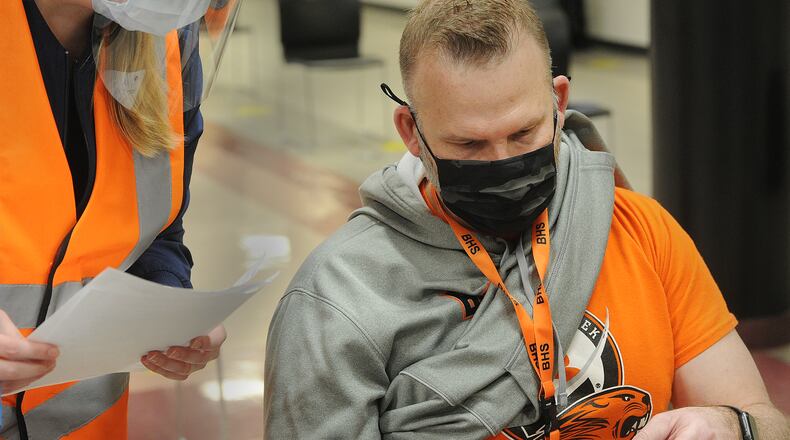“It’s generating a strong response by your immune system, which is, of course, what you want out of a vaccine. You trade one day of feeling crummy to avoid getting sick,” said Dr. Thomas Hirt, with PriMed Physicians. “It’s particularly the second dose because ... it’s the same shot, but then the body recognizes it more and has a stronger response, because it already has some of its defenses prepared.”
CDC data released a new vaccine safety monitoring report Feb. 19 finding mild reactions were common, there were rare reports of anaphylaxis were received, and no unusual or unexpected reporting patterns were detected. Data continues to be monitored and vaccinated people can download the V-safe app to check-in and add their symptom experience.
The agency is continuing to collect and evaluate data on the 22 million people who received them. Symptoms most frequently reported were headaches (22.4%), fatigue (16.5 %) and dizziness (16.5%).
“The vaccine side effects, although they can be troubling, they’re short lived. And they’re much better than getting a COVID infection. Because with COVID infection, you can end up with severe disease, you can end up in the hospital, and also, of course, you can transmit it to your contacts,” Dr. Jeffrey Weinstein, with Kettering Health Network, said.
While the symptoms are a sign of your immune response, even if you don’t have side effects, the vaccine is still work, Weinstein added.
“What we’re seeing is mostly symptoms like fatigue, muscle and body aches, chills, occasionally fever, though that’s less common headache,” Weinstein said.
A little under 13% of Ohioans — 1.5 million people — have received at least one dose of the vaccine, including 60% of Ohioans 80 and older. Health care workers, Ohioans 65 and older, teachers planning on in-person learning, and those with certain medical conditions are examples of those eligible so far.
Younger people so far are more likely to have side effects, which Weinstein said makes sense because younger people tend to have stronger immune responses.
People who have previously recovered from COVID-19 and received vaccines also are more likely to have more side effects after the first dose.
“The way you can think of it is that their immune system was primed with the COVID infection and the first dose was like a booster,” Weinstein said.
Rarely, some people also have swollen lymph nodes after the second dose as well. He said less than a tenth of a percent of people have a rare anaphylactic reaction, which is also a treatable reaction.
As increasingly younger people are added to the eligibility pool going forward, more people may need to take a day off work from side effects.
“Out of our three family practice doctors that got the vaccine, two of us had to call off work the next day,” Hirt said.
Chris Kershner, CEO of the Dayton Area Chamber of Commerce, said they haven’t asked businesses questions about time off to recover from vaccine side effects, but there are members who are offering paid time off to go get a vaccine.
He said every business is run differently and will make decisions that are in the best interest of their operations.
A few national employers like the VA have said they will give time off to recover from side effects if needed.
As of 2019, the US Bureau of Labor Statistics estimates that 24% of civilian workers in the US do not have paid sick leave.
If people have pain or discomfort, the CDC recommends they talk to their provider about taking over-the-counter pain reliever but people are advised not to take medication before vaccination for the purpose of trying to prevent side effects, because the CDC states that it is not known if these medications impact how well the vaccine works.
People are not full protected until after about two weeks after the second dose.
Even if people were already sick and recovered from COVID-19, they are still recommended to seek a vaccine when eligible.
Hirt said health experts don’t know exactly how long immunity lasts after illness but it appears that people are potentially susceptible to getting it again.
“We think for at least 90 days, you’re pretty unlikely to get COVID again, but with some new variants emerging, we don’t know for sure how much prior immunity protects you,” Hirt said.
About the Author

